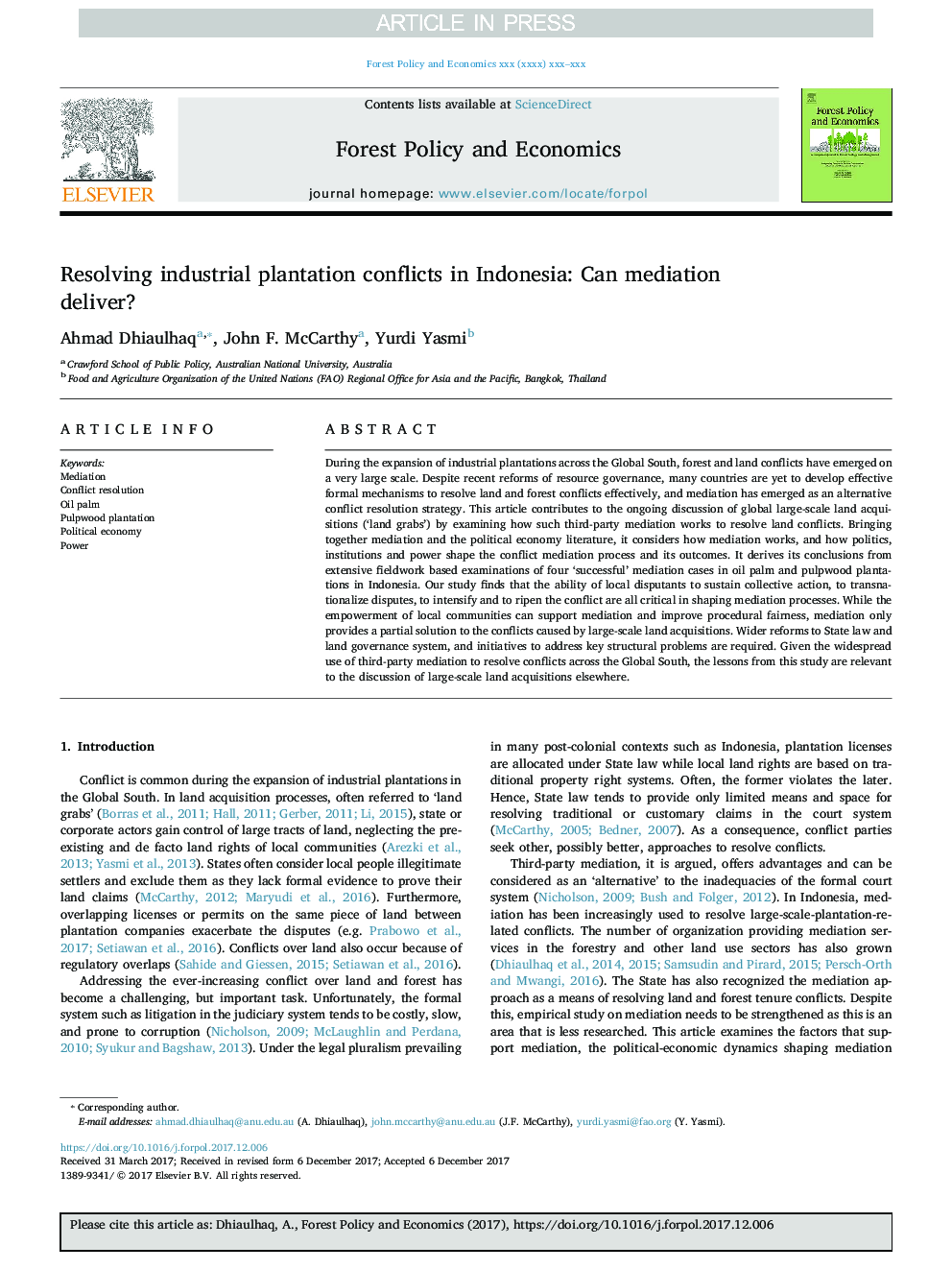| کد مقاله | کد نشریه | سال انتشار | مقاله انگلیسی | نسخه تمام متن |
|---|---|---|---|---|
| 6544759 | 1421647 | 2018 | 9 صفحه PDF | دانلود رایگان |
عنوان انگلیسی مقاله ISI
Resolving industrial plantation conflicts in Indonesia: Can mediation deliver?
ترجمه فارسی عنوان
حل مناقشات کشتار صنعتی در اندونزی: آیا می توان میانجی گری کرد؟
دانلود مقاله + سفارش ترجمه
دانلود مقاله ISI انگلیسی
رایگان برای ایرانیان
کلمات کلیدی
واسطه حل اختلاف، روغن نخل، کاشت گلبرگ، اقتصاد سیاسی، قدرت،
ترجمه چکیده
در طول گسترش گیاهان صنعتی در سراسر جهان جنوب، درگیری های جنگل و زمین در مقیاس بسیار گسترده ای ظاهر شده است. با وجود اصلاحات اخیر در زمینه مدیریت منابع، بسیاری از کشورها هنوز به منظور ایجاد سازوکار رسمی موثر برای حل اختلافات زمین و جنگل موثر نیستند و میانجیگری به عنوان یک استراتژی حل و فصل مناقشات جایگزین پدید آمده است. این مقاله به بحث در حال بحث در مورد خرید زمین های بزرگ در سطح جهانی کمک می کند، با بررسی این که چگونه چنین واسطه ای برای شخص ثالث برای حل اختلافات زمینی کار می کند. با در نظر گرفتن میانجیگری و ادبیات اقتصاد سیاسی، در نظر می گیرد که چگونه میانجیگری کار می کند و چگونه سیاست، نهادها و قدرت روند روند وجوه میانجیگری و نتایج آن را شکل می دهد. این نتیجه گیری های خود را از بررسی گسترده در زمینه زمینه های میدانی از چهار مورد "موفقیت آمیز" واسطه در کاشت نخل و نخل در اندونزی می یابد. مطالعه ما نشان می دهد که توانایی مخالفان محلی برای حفظ عمل جمعی، اختلافات بین المللی، تشدید و ایجاد اختلاف، در شکل گیری فرایندهای واسطه نقش مهمی دارند. در حالی که توانمندسازی جوامع محلی می تواند از میانجیگری حمایت کند و عدالت رویه ای را بهبود بخشد، واسطه تنها راه حل جزئی برای درگیری های ناشی از جمع آوری زمین های بزرگ را فراهم می کند. اصلاحات وسیع تر در مورد قوانین دولتی و سیستم حکومتی زمین و ابتکارات برای حل مشکلات ساختاری کلیدی مورد نیاز است. با توجه به استفاده گسترده از واسطه های شخص ثالث برای حل اختلافات در سراسر جهان جنوب، درس های این مطالعه مربوط به بحث در مورد خرید زمین در مقیاس های دیگر در جاهای دیگر است.
موضوعات مرتبط
علوم زیستی و بیوفناوری
علوم کشاورزی و بیولوژیک
جنگلداری
چکیده انگلیسی
During the expansion of industrial plantations across the Global South, forest and land conflicts have emerged on a very large scale. Despite recent reforms of resource governance, many countries are yet to develop effective formal mechanisms to resolve land and forest conflicts effectively, and mediation has emerged as an alternative conflict resolution strategy. This article contributes to the ongoing discussion of global large-scale land acquisitions ('land grabs') by examining how such third-party mediation works to resolve land conflicts. Bringing together mediation and the political economy literature, it considers how mediation works, and how politics, institutions and power shape the conflict mediation process and its outcomes. It derives its conclusions from extensive fieldwork based examinations of four 'successful' mediation cases in oil palm and pulpwood plantations in Indonesia. Our study finds that the ability of local disputants to sustain collective action, to transnationalize disputes, to intensify and to ripen the conflict are all critical in shaping mediation processes. While the empowerment of local communities can support mediation and improve procedural fairness, mediation only provides a partial solution to the conflicts caused by large-scale land acquisitions. Wider reforms to State law and land governance system, and initiatives to address key structural problems are required. Given the widespread use of third-party mediation to resolve conflicts across the Global South, the lessons from this study are relevant to the discussion of large-scale land acquisitions elsewhere.
ناشر
Database: Elsevier - ScienceDirect (ساینس دایرکت)
Journal: Forest Policy and Economics - Volume 91, June 2018, Pages 64-72
Journal: Forest Policy and Economics - Volume 91, June 2018, Pages 64-72
نویسندگان
Ahmad Dhiaulhaq, John F. McCarthy, Yurdi Yasmi,
